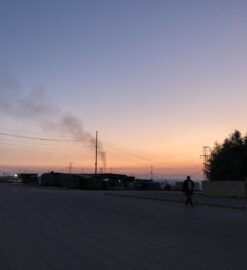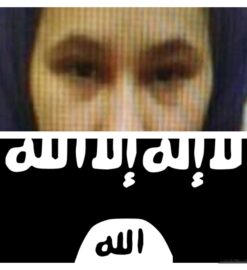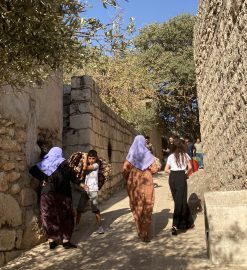The silent grief of the Yezidi women
Publication: MO* (also translated in Dutch and French).
Over the past year thousands of Jezidi women were made a slave and raped by Islamic State (IS) fighters. Some of them got away. They returned to Northern Iraq: ill, broken and severely traumatised.
The temperature is over 30 degrees, but Aniya is shivering. Now and then she wipes the sticky sweat off her forehead with her black headscarf or firmly rubs her hands. ‘He raped me’, she says at the beginning of the conversation, sitting on a kitchy couch with a flower print. And my three-year-old girl heard it, because she was in the other room. She cried and screamed, because she knew something was wrong, but he didn’t care. And me? I could only weep.
It isn’t immediately clear who ‘he’ is. That’s because Aniya was forced twice by Islamic State to marry one of their militants. The first one was named Aboe Safoean. He was 22 and she was 41, but in spite of the age difference he bought her and her daughter on a slave market in Raqqa, the self-appointed capital of IS in Syria, where she and other Jezidi women were brought. Aniya thought that because she was an ‘older woman’ they would leave her alone, respect the fact that she was married and had children, but it didn’t turn out that way at all.
To IS it doesn’t matter if the women are married or virgins, young or old: they all get raped systematically.
‘During the kidnapping I quickly handed my daughter to a neighbour, a family member, who was captured along with me. Here, I told her, if you have a child, they will think you’re not a virgin. Then you can go home.’
But for IS it didn’t matter if the women were married or virgins. Aniya was violated and abused by Abou Safouan during twenty days. After this she was sold to a bearded man who called himself Abou Ali Sjam and who was 27 years old. He too was a member of IS.
‘At a certain point I didn’t even want to take showers anymore so he would leave me alone. Really, I was hoping it so badly, but he kept on molesting me. He told me that if I would refuse him, or would try to get away, he would kill me and my daughter. I believed him, because when I went to the shop a few days later, I saw with my own eyes how women were shot in the streets. ‘Just like that’, she adds. A tear rolls down her cheek.
We are in a women’s center in Duhok, a city in the Kurdish part of Northern Iraq, where Jezidi women tell their stories one by one. In the room there is a light smell of sweat, that gets strengthened as soon as the airco breaks down again. In the living room next to it about ten women with long, gray skirts and loose headscarfs walk in and out. It’s a stark contrast with our local interpreter, who wears shiny earrings, a thick layer of make-up and high heels. But regardless of what they are wearing, everyone here has the same sad look in their eyes, even the Jezidi enterpreter.
Almost all the women in this center come from Kodjo, one of the villages in the Sindjar-mountains. On august 15 2014 IS invaded the Kurdish Jezidi village. Men and women were seperated. Hundreds of women and girls were kidnapped by IS. The boys were brought to sharia training camps by IS. The men, among whom Aniya’s lover, were all executed together. ‘None of the women here still have husbands. We are all alone’, she says.
Slave markets
The systematic rape of Jezidi women and girls is deeply rooted in the structure and organisation of IS, it shows from the stories of the women. They tell of the well-organised selling of slaves and how Jezidi women and girls were brought to empty houses, such as schools in Mosul and slave markets in Raqqa. How the youngest and most beautiful women were bought first by IS members, after they had put their name on a special slave list.
‘The older women were brought from place to place, until someone made an offer or until she was given as a ‘gift’ to other members of IS. The young virgins were already lifted out of the group beforehand’, says Nevin, a woman in her late twenties who was also captured by the terrorist group.
Every day Nevin saw how busses of women arrived and were dispatched to different towns, to be sold on slave markets.
She herself was brought to an empty school in Mosul shortly after her kidnapping. Every day she saw how busses of women arrived and were dispatched to cities such as Raqqa, to be sold on slave markets.
‘The situation in the school was terrible. We slept with hundreds of people on the ground and had nothing to eat or drink. It was dirty, surrounded by brick walls. I got very sick, mentally as well, so the militants of Daesh just left me there on the ground’, she says.
‘The school was meant as a gateway, but here girls and women were structurally violated and abused as well, Nevin remembers. ‘Each day they selected a few. They took them to separate rooms. Girls and women of all ages, from seven to seventy years old, were first drugged. Afterwards they were raped, often by several men at once. And when they were ready, they would beat the victims with sticks and water hoses. Get up, don’t cry, this is what you deserve, they would yell. When she speaks of the heinousness, she speaks slowly and articulately, as if she was reading an exciting scene from a thriller. Nevins dark eyes barely show emotion, until she describes what happened when a girl was returned to the group by the terrorists. Those moments where horrific. Because what do you say to your neighbour who has just been violated?
‘We often talked about suicide and thought of all kinds of plans. We said we would jump in the lake next to our building and swim in the deep until we would choke. Or we would put ourselves on fire’, she explains and and sighs deeply. ‘But it were only plans. Because Daesh saw everything, knew everything, also when you would just think about suicide…’
According to human rights organisations in Northern Iraq it isn’t unusual for traumatized Jezidi women to commit suicide. Some people do that to escape IS. Others do it when they are already freed, because they can’t recover from the trauma. Aniya recognizes that feeling. ‘I often thought: when I am dead, I will be free. But I didn’t do it because of my children. And I still don’t do it, although I think about it a lot.
Escape
According to the Seed Foundation, a registered charity institution in Erbil in Northern Iraq (about 100 kilometers east of Mosul), about 2093 Jezidi’s fled from IS, among whom 1332 women. Kurdish families and organisations collect money to buy the captured Jezidi back. Aniya could escape her “husbands” after eight months of horror. In June she and other Jezidi women, among whom her own daughter and someone from the same village, were saved by smugglers who had infiltrated the terrorist organisation. Others find a way to escape themselves, like Samira (20), a slim but lively young woman with dark blond hair and freckles, who is also staying here in the women’s center. When IS brought her from one place to another, she could escape. Together with other Jezidi’s she hid in a house, for over six days. One day the area was bombed. The group fled towards the mountains. ‘Because I was still in Kurdish territory, I knew precisely were I had to go’, she says, not without pride. ‘Eventually we saw the Kurdish Peshmerga, somewhere in the distance. They brought us to Duhok.’
Samira is one of the women who seem to have gotten out of the struggle rather unscathed. When members of IS stormed her birthplace, they asked her if she was married. Samira confirmed that and even showed them her wedding ring.
‘I also told them I was two months pregnant, but they didn’t believe me.’
‘I made myself look as ugly as I could by smearing mud on my face. What happened to you, the terrorists asked with abhorrence. I also told them I was two months pregnant, but they didn’t believe me. A lot of girls say this hoping that they will leave them alone’, says Samira, who explains to us that the members of IS usually wait until the first menstruation of a woman, so that they can be sure they are not pregant. ‘Because nobody wants to buy a pregnant woman.’
Social workers suggest that Jezidi women are first and foremost used as sex slaves by IS, just like girls who have just reached puberty. Behar Ali, the director of the women’s NGO Emma, recently met a nine-year-old child who was repeatedly raped by an adult IS-fighter. In the end the girl was saved, resold and brought back to Nothern Iraq.
‘She was in a terrible shape. Her uterus and ovaries were completely infected. She barely survived the operation. Such stories get into your soul.’
Shame
The women who have under IS rule and were salvaged, return broken, sick and severly traumatized to Northern Iraq. Yet most of them are open about what they have been through. Some of them are open because they feel they need someone to listen. Others speak out because they feel the world needs to know about what has been done to the Jezidi people.
Why isn’t the world helping us, or look at what IS is doing to us, we often hear in the women’s center.
The candour is remarkable. The Jezidi’s have always been a conservative community. The religious community believes in the purity of their lineage; Jezidi can’t marry outside of their community and praise chastity and honour above all.
Thus it doesn’t come easy that so many Jezidi women are coming back violated – there is a lot of empathy, but on the other hand there are still some tribal codes from the old days in use. It didn’t take long however, for the leader of the Jezidi community, the Baba Sheik, to make a statement encouraging his people to accept women who were abused by IS. ‘The survivors are still pure Jezidi’, he said. ‘It’s not their fault. We call for everyone to support the victims, so that they can live normally again and integrate into society.
But for some the wounds are still too fresh. Djinan (35), an unmarried Jezidi woman, still denies that she was violated by Abou Mochtar, the IS-fighter who bought her. She said she was used as a house slave and describes a domestic life, with fighters who came to and left the house and where the door was locked day and night.
‘He lived in a big, fancy house in Raqqa. I think he had stolen the house from local Syrians and that he had an important position in Daesh’, she says and she describes her tasks: washing, cooking and ironing. ‘But to him it was never enough. Each day he hit me all over the place. I couldn’t understand him very well since I barely speak Arabic. He was an aggressive man, but no, he never raped me.
Djinan takes a break and sips from her coffee. A few drops fall on her black shirt. That she had converted herself to Islam under coercion didn’t make a difference either. ‘They viewed us as a present, you see. They feel they are entitled to us, because in their eyes we are the unfaithful ones’, she says with a pervasive gaze. The local enterpreter touches her shiny earring. ‘She means that IS sees unfaithful women as a sexual reward,’ she says silently, even though none of the Jezidi women speak English.
Secret abortions
Women who have been freed from IS territory are first brought to a hospital in Duhok, where they are examined for sexually transmitted diseases and pregnancy. Aniya also underwent a medical examination, she says. Someone asked her if she was pregnant. Aniya stares at the floor uncomfortably. ‘The men whom I had married under force, gave me pills so that I couldn’t get pregnant. I haven’t heard of anyone who became pregnant of an IS-fighter’, she answers curtly.
Many girls and women return pregnant, NGO workers reckon. They secretely undergo abortions or take abortion pills.
Djinan pulls her headscarf over her black hair and confirms the story. ‘If it happens, if a girls turns out to be pregnant, then I do think her parents should help her. These girls should be helped. Always’, she says and she carefully continues: ‘I have heard of a woman who was pregnant of an IS fighter. I have no idea how she is doing now.’ Many girls and women return pregnant, NGO workers in Duhok acknowledge. They secretely undergo abortions or take abortions pills, says ‘Dawen’, a Kurdish NGO worker, who wishes her true name not to be known. ‘I don’t want any problems. This is a very sensitive matter.
In Northern Iraq abortion is illegal, even when rape is involved. An abortion can only be executed when labour threatens the woman’s life. Yet there are doctors who execute abortions. The pills come from the West, and are accepted and distributed in Northern Iraq by NGO’s.
The Kurdish ministery of public health knows about it, but is currently turning a blind eye. It rarely happens that Jezidi women decide to keep their violator’s child. A few weeks ago Dawen met two young Jezidi women who were pregnant with IS fighters. ‘These girls were sold eight times, and were violated several times. When they returned to their families, they were very traumatized. They had seen hell on earth. If they would have to keep those children, they would be confronted with a horrific period of their lives on a daily basis. It would literally mean the end of their lives.
Never home again
It keeps getting darker, and in the woman’s center it gets more and more quiet. Some return to the refugee camp. Others go to another refuge. None of these women can return to Kodjo, the village where they once lived. The houses are destroyed. There is still no sign of the men and boys. Many of them were executed by IS and were later found in mass graves. ‘Women are turned into slaves, and men are slaughtered. Just because we are Jezidi. They are beasts.’
Having almost finished the interviews, and wanting to say goodbye, Samira suddenly enters the room. She is holding her daughter, who is about five months old, firmly and pets the hair on her little head. The little girl giggles. Samira sits down on the couch again and gives her her bottle. We ask her who the father of the child is. ‘My husband. She looks like him’, she answers while smiling. It is the first time we see someone in the center smile genuinely. Suddenly the airco turns back on with a bang. Samira is scared and drops the bottle from her hands. Because of IS she still has daily nightmares. ‘I dream of terrorists who rape girls and behead men. I will probably never sleep as before again.’
Sometimes she dreams of her husband. It is still unknown what happened to him after IS stormed the village. Any hope that he is still alive, has long faded.
She misses him tremendously. ‘I will probably never see him again. Women are made slaves, and men are being slaughtered. And just because we are Jezidi. They are animals’, Samira concludes.



Leave a Reply